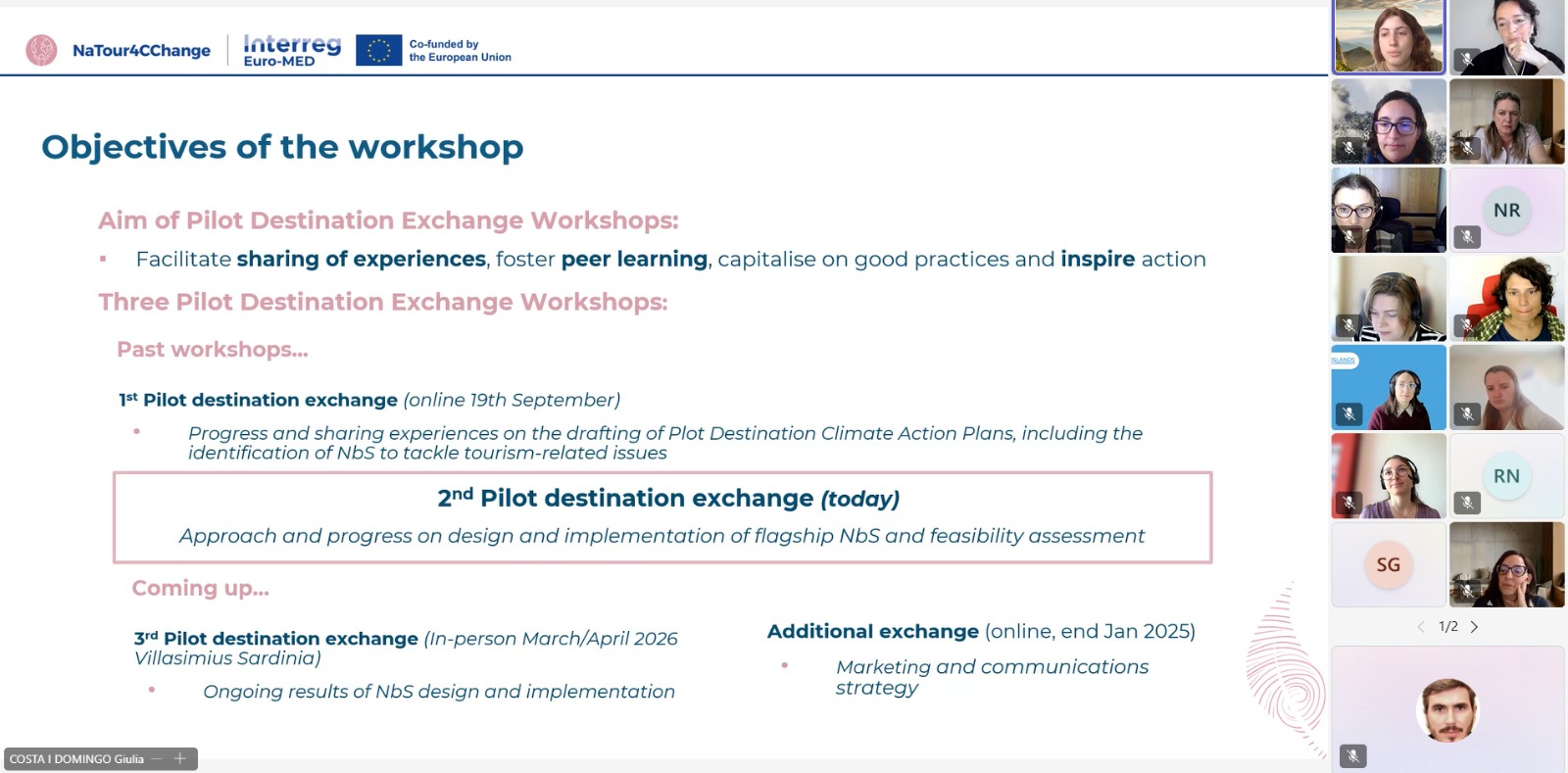Advancing Nature-Based Solutions Across Mediterranean Pilot Sites
On 4 November 2025, NaTour4Change (NT4CC) held its second Pilot Destination Exchange Workshop, bringing together representatives from the project’s six Mediterranean pilots to share progress, exchange experiences, and accelerate the implementation of Nature-based Solutions (NbS) in coastal tourism destinations. Held online, the session built on the collaborative momentum of the first workshop and set the direction for the project’s upcoming milestones toward resilient, climate-smart coastal management.
Sharing Progress on Flagship NbS Across Pilot Sites
 The workshop, moderated by IUCN Med, provided an open space for pilots to present their advancements on the selection of the NbS to be supported through NT4CC within their destination. The first steps of the process are being bolstered by the NbS tracker tool. Presented in the first pilot destination exchange, the NbS tracker provides a practical step-by-step guide to the selection of NbS in alignment with the IUCN NbS Standard. Pilot destinations shared their outcomes, experiences and challenges with the application of the tool to identify the opportunity space for their NbS.
The workshop, moderated by IUCN Med, provided an open space for pilots to present their advancements on the selection of the NbS to be supported through NT4CC within their destination. The first steps of the process are being bolstered by the NbS tracker tool. Presented in the first pilot destination exchange, the NbS tracker provides a practical step-by-step guide to the selection of NbS in alignment with the IUCN NbS Standard. Pilot destinations shared their outcomes, experiences and challenges with the application of the tool to identify the opportunity space for their NbS.
Participants from across the Mediterranean presented concrete advances from their pilot sites. The Cap-Ferrat (France) pilot presented the selection of NbS for preserving Posidonia seagrass beds, noting the ongoing challenges of engaging local stakeholders. The team at Capo Carbonara (Italy) outlined potential actions focused on enhancing capacity to mitigate beach erosion, extreme events and recovering vegetation through restoration action and community engagement . Dugi Otok (Croatia) shared progress in the design of an intervention to protect Posidonia banquettes and slow down beach erosion, highlighting challenges with involving local businesses in the design of this solution. The Kato Zakros and Koufonisi Island (Greece) pilot
presented measures for dune and native species protection, aligning climate adaptation with sustainable tourism opportunities. The Nature Park Hutovo Blato (Bosnia and Herzegovina) team discussed challenges at the site such as groundwater loss and eutrophication, emphasizing the importance of intersectoral cooperation. Finally, Cabo de Gata (Spain) reported progress on the selection of NbS linked to the protection of dune systems.
These presentations showcased both the diversity of local contexts and the shared ambition of the pilot sites to embed tourism resilience in ecosystem health and strong stakeholder collaboration, in line with the vision outlined in the Climate Action Plans.
Peer Review and Common Challenges
A structured peer review session, led by NBS Climate, encouraged open discussion on the differing stages of progress and recurring challenges across pilot destinations. Participants identified common issues including the need to engage stakeholders more effectively, especially in the tourism sector, the limited availability of ecological data and the difficulty of identifying the most suitable area for NbS implementation.
Participants discussed joint challenges and NBS Climate shared some initial recommendations for addressing these, stressing the importance of clearly defining opportunity spaces and establishing site-specific baselines to support effective prioritisation of NbS.
These exchanges strengthened the emerging community of practice among pilot sites, enabling lessons learned in one location to inform adaptive solutions in another.
Looking Ahead
The session concluded with a look at the next steps. Pilot sites are expected to complete the next step of the process (NbS Selection) using the NbS tracker tool by early December, preparing the ground for feasibility assessments and business model development in early 2026.
The next online meeting, planned for early 2026, will focus on marketing and communication strategies to enhance the visibility and uptake of NbS in tourism settings. Later in the year, an in-person workshop in Sardinia will offer space for hands-on collaboration and deeper peer learning on the economic and social dimensions of NbS implementation.


